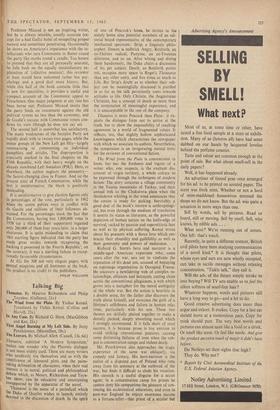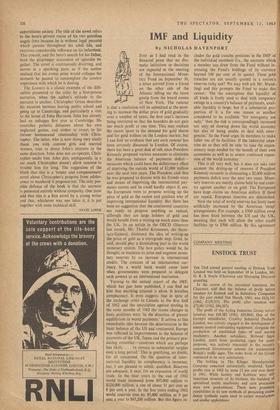Talking Big
Thanatos. By Maurice Richardson and Philip Joynbee. (Gollancz, 21s.) The Leavers. By Michael Allen. (Cassell, 13s. 6d.) Thanatos, subtitled 'A Modern Symposium,' makes one wonder why the Platonic dialogue is not more widely used. There are many writers Who needlessly tire themselves and us with the contrivance of laboured plots and the pains- taking delineation of characters, when their real interest is in moral, political and philosophical debate which, as Messrs. Richardson and Toyn- bee show, can be educative and entertaining unsupported by the apparatus of the novel. Thanatos' is the name of a periodical which the Duke of Quarles wishes to launch, entirely devoted to the discussion of death. In the spirit of one of Peacock's hosts, he invites to his stately home nine potential members of an edi- torial board representative of the contemporary intellectual spectrum: Strip, a linguistic philo- sopher, Jimson, redbrick Angry, Rexforth, an ex-Thirties radical, Pastyme, an ex-Twenties dilettante, and so on. After wining and dining theM handsomely, the Duke chairs a discussion of his pet subject. Death, as Rexforth points out, occupies more space in Roget's Thesaurus than any other entry, and five times as much as Life. But Strip's doubt as to whether their sub- ject can be meaningfully discussed is justified in so far as the talk persistently veers towards attitudes to life. Only Christie, the Augustinian Christian, has a concept of death as more than the termination of meaningful experience, and it is unacceptable to the rest of the company.
Thanatos is more Peacock than Plato: it ex- ploits the dialogue form not to arrive at the truth, but to show the impossibility of reaching agreement in a world of fragmented values. It reflects, too, that slightly hollow sophisticated knowingness which characterises the newspaper with which we associate its authors. Nevertheless, the symposium is an invigorating mental tonic for the reviewer of conventional fiction.
The Wind from the Plain is conventional in form, but has the freshness and vigour of a writer who, one suspects, is the exultant 'dis- coverer of virgin territory, a whole culture to be expressed through the techniques of modern fiction: The story concerns a village community in the Taurus mountains of Turkey, and their annual trek to the Chukurova plain when the thistledown whirling in the wind announces that the cotton is ready for picking. Inevitably a good deal of the book's interest is anthropologi- cal, but even through the medium of translation it asserts, its status as literature, as the powerful depiction of human nature on the knife-edge of survival, racked by-passion and superstitions fear as well as by physical suffering. Kemal writes about his peasants with a fierce love which em- braces their absurdity and guillibility as well as their generosity and powers of endurance.
Richard G. Sternzs hero and narrator is a middle-aged American expatriate who, some years after the war, sets out to vindicate the reputation of his dead son, accused of betraying an espionage organisation in Occupied France. He uncovers a bewildering web of complex re- lationships, alliances and betrayals, cutting clean across the conventional allegiances, a web which grows into a metaphor for the moral ambiguity of the whole war. But the action is heuristic in a double sense, for the father also discovers the truth about himself, and exorcises the guilt of a lifetime's selfishness and failure in human rela- tions, particularly with his son. These two themes are -skilfully plaited together to make a densely packed, deeply absorbing novel which I strongly recommend. If it •falls short of total success, it is because prose is too anxious to avoid striking conventional postures, causing some distressing failures of tone when the sub- ject is concentration camps and violent death.
Mr. Peterkiewicz also approaches the tragic experience of the same war obliquely, via comedy and fantasy. His hero-narrator is the native of a disputed part of Poland who runs away from his seminary at the outbreak of the war, but finds it difficult to elude his vocation. His cassock is a useful disguise for a secret agent; in a concentration camp for priests he cannot deny his companions the pleasure of con- tinuing his ecclesiastical education; and even in post-war England he enjoys enormous success as a fortune-teller—that priest of a secular but
superstitious society. The title of the novel refers to the hero's private vision of his two guardian angels (two because he is without legal parents) which persists throughout his adult life, and exercises considerable influence on his behaviour. This conceit, and the hero's search for his father, bind the picaresque succession of episodes to- gether. The novel is continuously diverting, and moves at a spanking pace, as if the author realised that his comic poise would collapse'the moment he paused to contemplate the sombre experience with which he is dealing.
The Leavers is a classic example of the diffi- culties presented to the critic by a first-person narrative, when the author's attitude to the narrator is unclear. Christopher Green describes his vacation between leaving public school and going up to Cambridge, and particularly a visit to the home of John Harrison. John has already had an unhappy first year at Cambridge. He nourishes pathetic delusions about his own neglected genius, and wishes to revert to his former homosexual relationship with Chris- topher. The latter, who is now doing very nicely thank you with convent girls and married women, tries to direct John's interests in the same direction. John does not co-operate; Chris- topher snubs him. John dies, ambiguously, in a car crash. Christopher doesn't allow remorse to trouble him for long. The suggestion of the blurb that this is a 'tender and compassionate' novel about Christopher's progress from adoles cence to manhood is preposterous. The only pos- sible defence of the book is that the narrator is presented entirely without sympathy. One must add that this is a first novel by a young writer and that, whichever way one takes it, it is put together with some technical skill.
DAVID LODGE .































 Previous page
Previous page